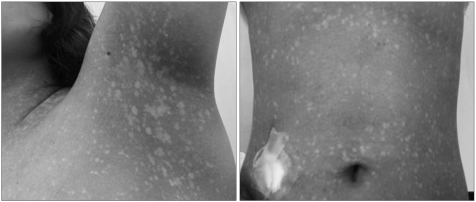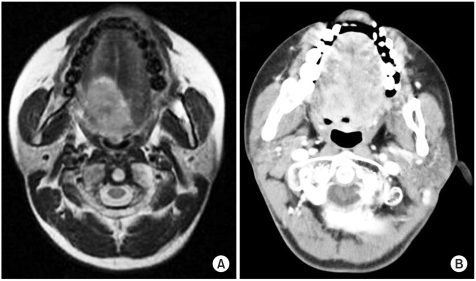Cancer Res Treat.
2005 Dec;37(6):370-373.
Gefitinib Trial in a Fanconi's Anemia Patient with Multiple Squamous Cell Carcinomas and Hepatocellular Carcinoma
- Affiliations
-
- 1Department of Internal Medicine, Ewha Womans University College of Medicine, Seoul, Korea. snlee@ewha.ac.kr
- 2Department of Pathology, Ewha Womans University College of Medicine, Seoul, Korea.
- 3Department of Internal Medicine, Seoul National University College of Medicine, Seoul, Korea.
Abstract
- FA (Fanconi's Anemia) is an autosomal recessive disorder that is characterized by pancytopenia with bone marrow hypoplasia, diverse congenital abnormalities and an increased predisposition towards malignancy. The mainstay of the treatment for these cancers has been surgery, because of the hypersensitive reactions of FA patients to DNA cross- linking agents or radiation. Therefore, there has been no effective therapy for advanced squa mous cell carcinoma. We report here on a patient suffering from advanced multiple squamous cell carcinoma and hepatocellular carcinoma along with an FA, and this patient was treated with gefitinib.
Keyword
MeSH Terms
Figure
Reference
-
1. Esparza A, Thompson WR. Familial hypoplastic anemia with multiple congenital anomalies (Fanconi's syndrome)-report of three cases. Cases presented are of two sisters and a female cousin with complete clinical and post mortem findings. R I Med J. 1966; 49:103–110. PMID: 5217141.2. Guy JT, Auslander MO. Androgenic steroids and hepatocellular carcinoma. Lancet. 1973; 1:148. PMID: 4118484.
Article3. Lustig JP, Lugassy G, Neder A, Sigler E. Head and neck carcinoma in Fanconi's anaemia-report of a case and review of the literature. Eur J Cancer B Oral Oncol. 1995; 31B:68–72. PMID: 7627092.
Article4. Oksuzoglu B, Yalcin S. Squamous cell carcinoma of the tongue in a patient with Fanconi's anemia: a case report and review of the literature. Ann Hematol. 2002; 81:294–298. PMID: 12029542.5. Ugocsai K, Mandoky L, Tiszlavicz L, Molnar J. Investigation of HER2 overexpression in non-small cell lung cancer. Anticancer Res. 2005; 25:3061–3066. PMID: 16080566.6. Doroshow JH. Targeting EGFR in non-small-cell lung cancer. N Engl J Med. 2005; 353:200–202. PMID: 16014890.
Article7. Xu H, Yu Y, Marciniak D, Rishi AK, Sarkar FH, Kucuk O, et al. Epidermal growth factor (EGFR)-related protein inhibits multiple members of the EGFR family in colon and breast cancer cells. Mol Cancer Ther. 2005; 4:435–442. PMID: 15767552.8. Herbst RS. ZD1839: targeting the epidermal growth factor receptor in cancer therapy. Expert Opin Investig Drugs. 2002; 11:837–849.
Article9. Von Pawel J. Gefitinib (Iressa, ZD1839): a novel targeted approach for the treatment of solid tumors. Bull Cancer. 2004; 91:E70–E76. PMID: 15582898.10. Ranson M. ZD1839 (Iressa): for more than just non-small cell lung cancer. Oncologist. 2002; 7:16–24. PMID: 12202784.
Article11. Cohen EE, Rosen F, Stadler WM, Recant W, Stenson K, Huo D, et al. Phase II trial of ZD1839 in recurrent or metastatic squamous cell carcinoma of the head and neck. J Clin Oncol. 2003; 21:1980–1987. PMID: 12743152.
Article12. Cohen EE, Stenson K, Gustin D, Lamont E, Mauer A, Blair E, et al. A Phase II study of 250 mg gefitinib (ZD 1839) monotherapy in recurrent and/or metastatic squamous cell carcinoma of the head and neck. Proc Am Soc Clin Oncol. 2003; 22:2021.13. Hirsch FR, Varella-Garcia M, McCoy J, West H, Xavier AC, Gumerlock P, et al. Increased epidermal growth factor receptor gene copy number detected by fluorescence in situ hybridization associates with increased sensitivity to gefitinib in patients with bronchioloalveolar carcinoma subtypes: a southwest oncology group study. J Clin Oncol. 2005; 23:6838–6845. PMID: 15998906.
Article14. Cappuzzo F, Varella-Garcia M, Shigematsu H, Domenichini I, Bartolini S, Ceresoli GL, et al. Increased HER2 gene copy number is associated with response to gefitinib therapy in epidermal growth factor receptor-positive non-small-cell lung cancer patients. J Clin Oncol. 2005; 23:5007–5018. PMID: 16051952.
Article
- Full Text Links
- Actions
-
Cited
- CITED
-
- Close
- Share
- Similar articles
-
- Squamous Cell Carcinoma of Oral Cavity and Metachronously Developed Hepatocellular Carcinoma Arising from Fanconi's Anemia
- Fanconi's Anemia
- Treatment of Tongue Cancer in Patient with Fanconi's Anemia
- Xeroderma Pigmentosum: The Treatment of Associated Skin Cancer
- Triplication of 1q in a Patient with Myelodysplastic Syndrome




